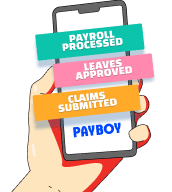Navigating backdated pay in Singapore's employment landscape is essential for employers to ensure compliance and fair compensation practices. In this comprehensive guide, we'll delve into the intricacies of backdated pay, covering key questions such as what it entails and its classification under CPF regulations. Additionally, we'll discuss the implications of backdated pay on CPF contributions and address common queries regarding its processing for new hires joining post-payroll cut-off dates. Join us as we demystify backdated pay to empower employers with clarity and insights into managing payroll effectively in Singapore.
What is backdated pay?
Backdated pay refers to compensation or salary that is paid to an employee for work done in a previous period, typically before the current pay period. It may occur when there is a delay in processing payroll or when adjustments are made to an employee's salary retrospectively.
Are retro pay and backdated pay the same thing?
Yes, retro pay and backdated pay are often used interchangeably to describe compensation paid to employees for work performed in a previous period. Both terms refer to the payment of wages or salary for time worked in the past, which may have been overlooked or delayed initially.
Can salary increments be backdated?
Yes, salary increments can be backdated in certain circumstances, such as when an employer agrees to retroactively increase an employee's salary for a specific period. However, employers should adhere to legal and contractual obligations and ensure transparent communication with employees regarding any salary adjustments.
Example:
Jayden has been consistently performing exceptionally well for the past 12 months. After a performance review held in April, his employer decided to award him a salary increment of $500 per month, effective from February. The salary increment from February to March is therefore considered a retrospective salary increment.
Is backdated pay classified as Ordinary Wages (OW) or Additional Wages (AW)?
Backdated pay can be categorised as either Ordinary Wages (OW) or Additional Wages (AW) depending on the circumstances.
- When retrospective salary increments are applied from an earlier month, the backdated amount is considered Additional Wages (AW).
- Conversely, if a salary increment was payable earlier but delayed due to administrative issues, it's classified as Ordinary Wages (OW). In such cases, late payment interest may apply.
Example:
- If a salary increment decided in April is backdated to February, the increment for February to March is considered AW for April.
- However, if the increment was due in February but paid late in April due to administrative error, the employer must compute the CPF shortfall for February and March and pay it promptly, along with applicable late payment interest as the CPF contributions are late.
Tip: Learn the difference between OW and AW with our comprehensive Ordinary Wages (OW) and Additional Wages (AW) guide for employers in Singapore!
Is backdated pay subjected to CPF contribution?
Yes, backdated pay is generally subject to CPF contribution in Singapore. Employers are required to contribute CPF for their employees' wages, which include backdated pay, based on the applicable contribution rates and wage ceilings set by the Central Provident Fund (CPF) Board.
If the backdated pay is considered as Additional Wages (AW), the estimated Additional Wage ceiling is computed as = $102,000 - Total Ordinary Wages subjected to CPF for the year
Tip: Keeping up with the changes in regulations can be tough while running a business. Learn more with our latest CPF guide for employers which covers CPF regulations and contribution rates. You can also use our CPF calculator for Singapore citizens and CPF calculator for Permanent Residents (PR) to estimate CPF contributions for your employees accurately!
Can I process pay for new hires who joined after the payroll cut-off date as backdated pay?
In Singapore, the Employment Act mandates that salaries be paid at least once a month, within 7 days after the end of the salary period. Therefore, it's essential to process pay for new hires within the same salary month, even if they join after the payroll cut-off date, to ensure compliance with regulations.
Example
New Hire: Sarah
Age: 35 years old
Joining Date: 25th January 2024
Payroll cut-off date for each salary month: 20th of every month
Monthly Salary: $7,000
Sarah’s prorated salary in January 2024 =
5/23 working days x $7,000 = $1521.70
Sarah’s CPF Contribution in January 2024 is therefore $563.04.
- Employee Contribution: $1521.70 * 20% = $304.35
- Employer Contribution: $1521.70 * 17% = $258.69
- Total CPF Contribution for January 2024 = $304.35 (Employee) +$258.69 (Employer) = $563.04
Even though Sarah joined after the payroll cut-off date, her prorated salary for January 2024 should still be paid by the latest 7 February 2024 to comply with the Employment Act. Her prorated salary for January is $1521.70, resulting in a CPF contribution of $563.04.
Process backdated pay easily with Payboy HR Software!
In cases of backdated pay, it's crucial for employers to efficiently manage salary adjustments to ensure accuracy and compliance with regulations. But fret not; Payboy HR software is here to help! Here’s how you can use Payboy to manage your salary adjustments.
With our fully compliant, customisable, and integrated payroll processing module, you can calculate payroll with ease with additional features that are designed to save you time and effort.
- 100% compliance and 100% peace of mind
- Forget about payroll and SDL calculations, CPF contributions, and IR8A submissions. Our software will automatically calculate them for you and keep you compliant with the latest regulations from MOM, CPF, and IRAS.
- Covers any work arrangement
- Transparent, Accurate, and Simple
- Have full visibility on how payroll is calculated automatically based on shifts, attendance, leave, and submitted claims within an intuitive experience.
- Customisable itemised payslips
- Fully integrated with your preferred platforms
- We’ll fit into your ecosystem seamlessly and keep your finance team happy. Learn more about our seamless integrations with Xero, Financio, and Quickbooks.
Streamline your HR processes with Payboy today!
As a PSG-approved HRMS, Payboy provides a robust system to help you manage your HR tasks so that you can focus on your business and people!
With our wide range of modules, you can customise a solution to meet the specific needs of your business:
Payroll Processing | Leave Management | Claims Management | Applicant Tracking
Time Attendance | Shift Scheduling | Appraisal System | Inventory Management
Project Costing | Training Management






















